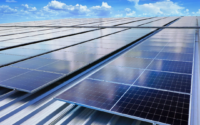What Is Renewable Energy, And What Are Its Advantages?
Renewable energy is the use of natural resources to generate electricity, rather than using nonrenewable resources like coal or oil. As the world moves further away from carbon-based fuels, renewable energy is becoming more and more popular. Here are some of its advantages:
Renewable Energy Provides a Secure Future – Renewable energy provides a secure and sustainable future because it doesn’t rely on finite resources.
Renewable Energy Is Green – Renewable energy is environmentally friendly, as it doesn’t produce greenhouse gases.
Renewable Energy Is Cost-Effective – Renewable energy is cost-effective, as it doesn’t require large investments in infrastructure.
What is Renewable Energy?
Renewable energy is energy that comes from natural sources, such as the sun and wind. Renewable energy is growing in popularity because it is environmentally friendly, affordable, and reliable.
The benefits of using renewable energy include: reducing greenhouse gas emissions; providing a stable power supply; and creating jobs. Solar panels, for example, are becoming increasingly popular because they use less energy than traditional sources, like coal or oil.
Renewable energy can also be used to generate electricity for vehicles and homes. Solar panels can be installed on roofs to generate power for cars and homes, while wind turbines can be placed in strategic locations to generate power for businesses and homes.
Types of Renewable Energy
Renewable energy refers to any energy source that can be regenerated or reused. These sources include solar, Bioenergy, Wind Energy, Geothermal Energy, biomass, and hydropower Energy. Renewable energy has many advantages over traditional energy sources, including the following:
-Renewable energy is environmentally friendly because it doesn’t produce emissions that contribute to climate change.
-Renewable energy doesn’t depend on natural resources that may be scarce or unavailable in the future.
-Renewable energy is cost-effective when compared to traditional sources of energy.
-Renewable energy can provide power when electricity demand is high, which reduces reliance on traditional power sources such as fossil fuels.
Advantages of Renewable Energy
Renewable energy refers to energy sources that can be continually regenerated, such as solar, water, wind, and wave. Renewable energy has several advantages over conventional energy sources.
First of all, renewable energy is eco-friendly. It doesn’t produce greenhouse gases like carbon dioxide, which harms the environment. Renewable energy helps mitigate climate change by reducing reliance on fossil fuels.
Second, renewable energy is cost-effective. Unlike conventional sources of energy, which require large upfront costs but offer lower long-term costs, renewable energy offers both lower upfront costs and longer-term savings. For example, installing a solar panel typically results in an initial outlay but then produces electricity at no cost for the lifetime of the installation. On the other hand, buying a gasoline engine typically results in an upfront expense but will require ongoing maintenance and fuel costs over time.
Third, renewable energy is reliable. Unlike conventional sources of energy which can be disrupted by weather or technical problems, renewables are virtually immune to these types of disruptions. This means that renewables can be relied on to provide clean and affordable power wherever they are needed most – even during times of peak demand – without putting the reliability of the grid at risk.
Fourth, Renewable Energy is sustainable. Unlike conventional sources of energy which have finite lifetimes (such as gasoline engines), renewables tend to have longer lifespans (such as solar panels). This means that renewable Energy resources can be used
Conclusion
Renewable energy is one of the most important topics facing the world today. We must find ways to use this type of energy without damaging our environment, and renewable energy is a great way to do just that. Renewable energy sources include solar, wind, hydroelectric, geothermal, and biomass. By using these sources of energy, we are not only helping to reduce the amount of pollution produced by traditional forms of electricity generation, but we are also helping to protect our planet from future damage.


